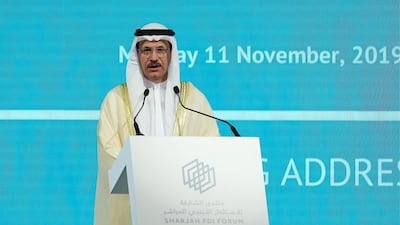The cumulative value of foreign direct investment in the UAE climbed to $140.3 billion (Dh513.8bn) at the end of 2018, as the second-biggest Arab economy continues to implement reforms and attract foreign capital despite global economic headwinds.
An 8 per cent year-on-year rise in the aggregate value of FDI to the UAE in 2018 bucked a global trend, the UAE Minister of Economy Sultan bin Saeed Al Mansouri told the Sharjah FDI Forum on Monday, as last year was the third consecutive year of falling inflows with investment declining by 19 per cent, according to the United Nations Conference on Trade and Development.
FDI flows sank by 40 per cent in developed economies, 73 per cent the European Union countries and 8 per cent in 'transition economies', according to UNCTAD's Global Investment Trade Monitor. Developing economies remained on growth trajectory, however, with a 3 per rise in attracting foreign capital.
"The UAE is not isolated from global markets. It has an open economy and is vitally linked to the global economy,” Mr Al Mansouri said. “However, the declining trend of FDI around the world hasn’t had a negative impact on the country's ability to attract investment.”
Asian economies ranked first in injecting direct investments in the UAE, followed by Europe, North America and Africa, he said, adding that the UAE took the second spot globally in signing international bilateral investment agreements and was third globally in new FDI project announcements.
These achievements, the minister said, were not a “coincidence”, but rather the result of the UAE leadership’s push to become a global FDI destination.
“The country is keen on formulating strategies that strengthen its position as a leading player in attracting quality investment that supports development plans based on innovation, knowledge, technology and the digital economy,” the minister noted.
Attracting foreign investments across sectors is a key priority of the UAE government as its cut its reliance on oil revenues and continues to diversify its economy. The country in November 2018 introduced a new FDI law and in July this year announced a list of 122 economic activities across 13 sectors where foreign investors would be allowed 100 per cent ownership, including renewable energy, space, agriculture, manufacturing, transport, logistics and hospitality, among others. Sweeping visa changes, steps to reduce fees and the removal of administrative barriers have also boosted investments.
Different emirates are also implementing their own initiatives to increase foreign capital flows. Dubai has attracted Dh46.6bn in FDI in the first half of 2019, up 135 per cent on the same period last year, the Dubai Media Office said in September.
Sharjah on Monday announced the launch of Sharjah Investors Services Centre, or Saeed, a one-window operation in the emirate that will provide all government services to foreign direct investors in “a record time”, including the issuing of licences and project approvals, Mohammed Juma Al Musharrkh, chief executive of Sharjah FDI Office, told delegates on Monday.
The emirate in the first quarter of the this year has received $504.5 million in FDI in 15 projects with in average investment of $33m, which created 539 new jobs, according FDI consulting firm Wavteq data. The FDI figure climbed to $571m across sectors in the second quarter of this year.


